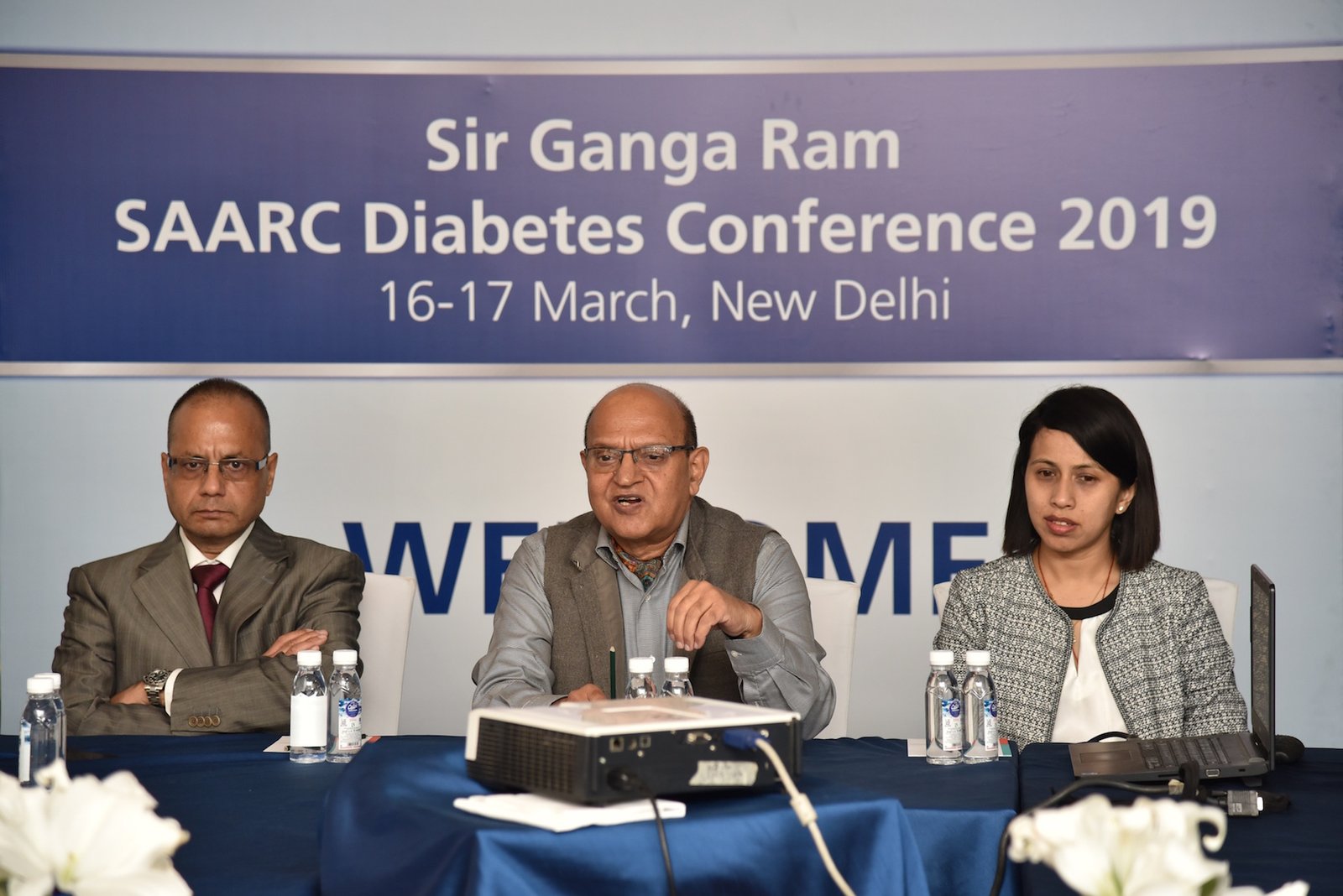Annual SAARC conference puts emphasis on effective diabetes management
March 18, 2019 | Monday | News
The conference was attended by leading team of endocrinologists from across countries like Bangladesh, Nepal, Sri Lanka in addition to all leading medical practitioners from the country
(L-R)- Dr Sudhir Tripathi, Prof (Col) Surender Kumar, Dr Dina Shrestha
A team of leading endocrinologists from SAARC countries recently inaugurated the annual ‘SAARC Diabetes Conference’ in New Delhi. The themes of this year’s conference is ‘Sharirmadyam Khalu Dharmasadhanam’ which lays importance on an individual’s responsibility to keep his body healthy. Good health is key to wellness and contributes to the overall performance of an individual.
The two-day annual conference organised under the aegis of Dept. of Endocrinology and Metabolism at Sir Ganga Ram Hospital. is the only platform that brings leading medical experts from SAARC countries together to exchange best practices, update on latest products and other technical advancements that can aid in improving the overall management of Diabetes.
Opened by Prof (Col) Surender Kumar, President of SAARC Diabetes Association, the conference was attended by all leading endocrinologists across the country including Dr V Mohan, Dr Nikhil Tandon and Dr Ambrish Mittal amongst other dignitaries. It was also attended by like-minded stakeholders and practitioners from SAARC countries who highlighted the progress made over the past year towards tackling diabetes in their respective regions as a result of focused awareness programs undertaken. “SAARC countries are among the highest populations of people with diabetes. This conference enables us to exchange key notes, progress and developments on improving the way Diabetes is managed currently. In India specifically, ‘IMPACT India the 1000-Day Challenge’ provides a clear goal and direction for improving diabetes care by reducing HbA1c by 1% over a 3-year period. This is the primary program that can serve as a guide for other countries to learn from”, said Prof (Col) Surender Kumar, Chairman, Department of Endocrinology & Metabolism, Sir Ganga Ram Hospital.
As per the 8th edition of IDF Diabetes Atlas, the incidence of Diabetes in South East Asian countries was found to be over 82 million in 2017 which is expected to grow upto 151 million by the end of 2045. This clearly indicated that worldwide, there is a steady increase in the diabetes population owing to ignorance and sedentary lifestyle. Especially in the Indian sub-continent, the high incidence rate of diabetes, has led to a significant health burden. This teamed with lack of awareness and undiagnosed diabetes has paved way for the rise of various heart, kidney, eye and limb diseases. “In India alone, 1 in 12 adults suffer from diabetes and over 11.2 lakh succumb to its complications. To combat this growing burden, the need of the hour is to burst myths and improve awareness on the need to manage diabetes better by adopting a healthy lifestyle and being aware”, adds Dr Sudhir Tripathi, Senior Consultant, Department of Endocrinology & Metabolism, Sir Ganga Ram Hospital.
About IMPACT India: 1000 Day Challenge:
Under IMPACT India, the 1000 Day challenge, Novo Nordisk Education Foundation has taken an initiative to improve awareness and education amongst 150,000 practitioners and 10,000 paramedics through over 6,000 medical meetings and continuous medical education (CMEs) programmes. Novo Nordisk Education Foundation has also developed India Diabetes Care Index, a tool to track progress of diabetes care in India that provides a first ever real-time data on the state of diabetes care and the average blood sugar found in people living with diabetes. Currently, as per this index, the three-month average HbA1c level of people with diabetes in key cities is high against the recommended target of <7%. Delhi is found to be at 8.53%, Mumbai at 8.13%, Chennai at 8.41% and Kolkata at 8.24%. India on the whole is found to be at an average HbA1c of 8.51%. Through this program, the ambition is to improve the understanding of the principal factors behind the rise of diabetes in India, enhance understanding on uncontrolled diabetes and then share and apply that knowledge to real-world solutions for people to live healthier lives with diabetes.









